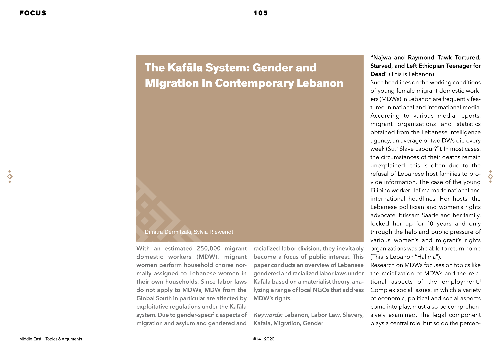The Kafāla System: Gender and Migration in Contemporary Lebanon
With an estimated 250,000 migrant domestic workers (MDW), migrant women perform household chores normally assigned to Lebanese women in their own households. Since labor laws do not apply to MDWs, MDW from the Global South in particular are affected by exploitative regulations under the Kafāla syste...
Gorde:
| Argitaratua izan da: | Middle East - Topics & Arguments |
|---|---|
| Egile Nagusiak: | , |
| Formatua: | Artikel (Zeitschrift) |
| Hizkuntza: | ingelesa |
| Argitaratua: |
Philipps-Universität Marburg
2020
|
| Gaiak: | |
| Sarrera elektronikoa: | Sarrera elektronikoa |
| Etiketak: |
Etiketa erantsi
Etiketarik gabe, Izan zaitez lehena erregistro honi etiketa jartzen!
|
| Gaia: | With an estimated 250,000 migrant domestic workers (MDW), migrant women perform household chores normally assigned to Lebanese women in their own households. Since labor laws do not apply to MDWs, MDW from the Global South in particular are affected by exploitative regulations under the Kafāla system. Due to gender-specific aspects of migration and asylum and gendered and racialized labor division, they inevitably become a focus of public interest. This paper conducts an overview of Lebanese gendered and racialized labor laws under Kafāla based on a materialist theory, analyzing a range of local NGOs that address MDW’s rights. |
|---|---|
| DOI: | 10.17192/meta.2020.14.8255 |
 Publikationsserver
Publikationsserver